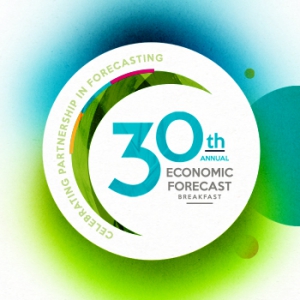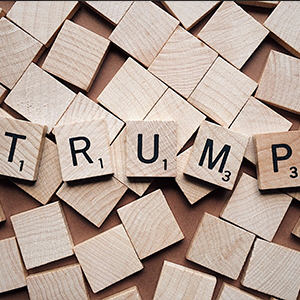 Wow. Donald Trump has been President of the United States for less than three weeks and he has caused a stir that no one predicted. Okay, perhaps he predicted it, but none of us were taking him at his word by the date of election. As Brian Wesbury (Chief Economist for First Trust Advisors Chicago, IL and our speaker at the annual Lakeland Economic Forecast Breakfast) said, “you don’t necessarily take Donald Trump literally, but you must take him seriously”.
Wow. Donald Trump has been President of the United States for less than three weeks and he has caused a stir that no one predicted. Okay, perhaps he predicted it, but none of us were taking him at his word by the date of election. As Brian Wesbury (Chief Economist for First Trust Advisors Chicago, IL and our speaker at the annual Lakeland Economic Forecast Breakfast) said, “you don’t necessarily take Donald Trump literally, but you must take him seriously”.
By the way, if you missed the Economic Forecast Breakfast and haven’t heard the podcast yet, go to Allen & Company’s website and find the presentation at:
https://alleninvestments.com/30th-annual-economic-forecast-breakfast-with-brian-wesbury/
Brian is interesting, funny and encouraging and it is certainly worth a listen. Laura Hawley introduces him beginning at the 19:00 mark of the pod cast.
So back to President Trump, what is he going to do next? It is high entertainment for me to watch the Twitter blasts coming out of the White House and the subsequent wringing of hands in the media each day. It is more interesting than college basketball even…at least until March.
But don’t let my glib statement fool you, while it is interesting, captivating and yes even often entertaining to see the approach to governing this administration is taking, It is deadly serious business for all of us.
 As an investor, I am encouraged by President Trump’s commitment to deregulation – the broad statement that departments must reduce the number of existing regulations by 2 to enact one new one is probably a good tone-setting approach to the beginning of this change in Washington. While not all regulations are bad, and many are essential, most of us would agree that the regulations stifling economic growth have swung to the excess level since 2008.
As an investor, I am encouraged by President Trump’s commitment to deregulation – the broad statement that departments must reduce the number of existing regulations by 2 to enact one new one is probably a good tone-setting approach to the beginning of this change in Washington. While not all regulations are bad, and many are essential, most of us would agree that the regulations stifling economic growth have swung to the excess level since 2008.
The old debates will remain: can we have economic growth fueled by fossil fuels, and maintain the quality of the environment? Can we relax banking regulations to encourage lending and support business growth, but not create a lending bubble like we saw in 2008?
I will not try to sort out those arguments here because (a) it would take too many words and pages of carefully reasoned, unemotional thought-filled arguments, (b) at least 50% of you would get angry and stop reading me forever, (c) something closer to 100% of you will disagree with me anyway and find my arguments to be more emotional that factual, simply wrong in too many specifics, and generally ill-informed and unenlightened. As I say: The debates will remain.
And while our country seems to be divided into camps that hurl the “you are more emotional than factual, simply wrong in too many specifics, and generally ill-informed and unenlightened” responses back and forth, there are a couple of things upon which the investor should focus.
While I was more pessimistic in 2016 regarding the equities markets than I have been in a long time, with the market up 10%+ since October, I am now cautiously about the equities market this year. Why do I feel this way? Because the Administration’s commitment to cutting regulations, coupled with the commitment to tax cuts by both the Administration and Congress, has the potential to give freer rein to economic growth and could possibly move us above the anemic 1% to 2% growth range we have seen the past 8 years.
On the other side of the coin, I am fearful what a trade war could do to the US, as well as international, economies. The tendency to discuss international negotiations via Twitter is a concern, as is the stance on free trade and threatened tariffs.
But we will save international trade discussions for another day since the topic is too vast and I don’t understand all the nuances of cause and effect (like everybody else that pontificates on that particular subject).
But for now, let’s be cautiously optimistic and enjoy the day. If nothing else, it’s February in Florida and the highs are hitting 75 degrees F!
February 2017
Content in this material is for general information only and not intended to provide specific advice or recommendations for any individual. All performance referenced is historical and is no guarantee of future results. All indices are unmanaged and may not be invested into directly.
